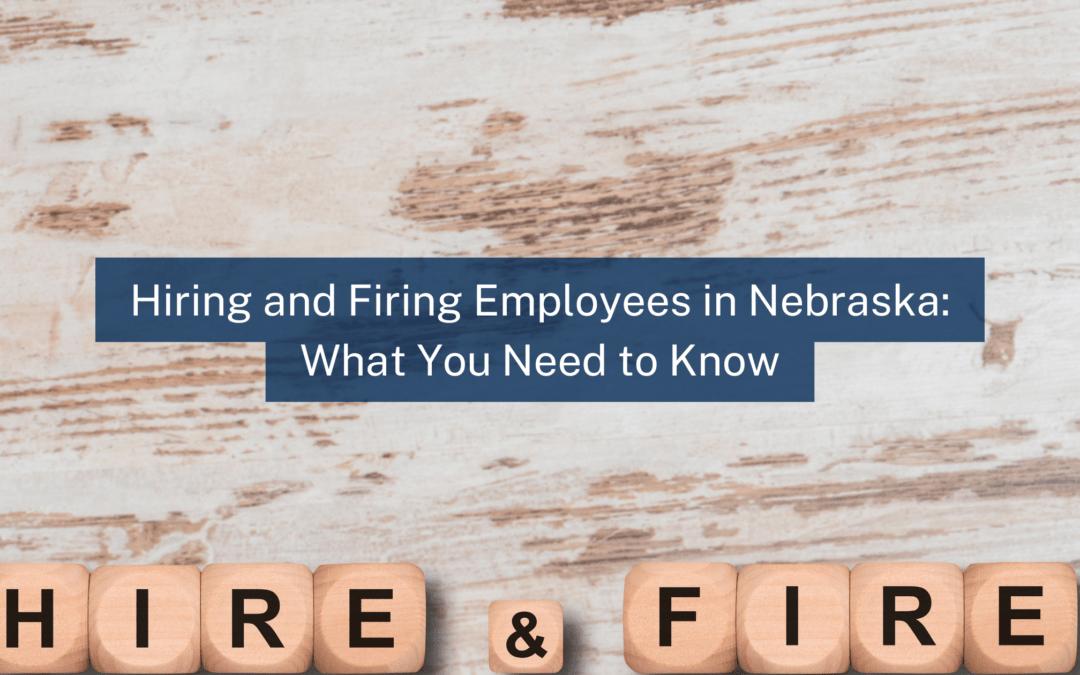DISCLAIMER: THE INFORMATION CONTAINED HEREIN IS SOLEY FOR EDUCATIONAL PURPOSES. IT IS NOT LEGAL ADVICE OR LEGAL AUTHORITY AND IS ONLY THE AUTHOR’S INTERPRETATION OF THE LABOR AND EMPLOYMENT LAW FOR HIRING AND FIRING EMPLOYEES IN NE.
In Nebraska, like in most states, there are specific regulations and considerations to keep in mind when it comes to hiring and firing employees. Public entities have more requirements and opportunities to provide to the employee prior to termination than those private employers. Here’s an overview of what you should consider when hiring persons and when you want to fire employees:
Hiring:
- Equal Employment Opportunity Commission (EEOC) Compliance: Nebraska employers must comply with federal laws prohibiting discrimination in hiring based on protected characteristics such as race, color, religion, sex, national origin, age, disability, or genetic information. It’s important to ensure fair and unbiased hiring practices that demonstrate a neutral and job specific criteria for applicants to meet.
- Employment Eligibility Verification (Form I-9): Employers in Nebraska must verify the employment eligibility of new hires by completing and retaining Form I-9, Employment Eligibility Verification, for each employee hired after November 6, 1986. This verification process is a protection for employers when reviewing potential applicants.
- Background Checks: Nebraska employers must comply with federal and state laws regarding background checks. It’s important to understand what information can be legally obtained and considered in the hiring process and to obtain proper consent from candidates. There are certain statutes that may guide and/or dictate information required to be shared by other Nebraska based employers to other Nebraska employers, but those statues are career specific. of employment, but there are regulations governing how and when such testing can be conducted.
- Employment Contracts and Offer Letters: While Nebraska is an “at-will” employment state, meaning that either the employer or the employee may terminate the employment relationship at any time, it’s still advisable to have clear employment contracts or offer letters outlining terms of employment, including job duties, compensation, benefits, and any other relevant terms. This eliminates any confusion regarding the employers expectations and the employee’s understanding of what is required should they accept the offer of employment.
Firing:
- At-Will Employment: Nebraska follows the principle of at-will employment, meaning that employers can generally terminate employees at any time, with or without cause, and with or without notice. However, there are exceptions to this rule, such as when termination violates federal or state anti-discrimination laws, breaches an employment contract, breaches a collective bargaining agreement or violates public policy. Municipalities have additional obligations to adhere to when firing an employee. Further, if the employee is part of a civil service career, there are also additional requirements afforded to the employee prior to termination per Nebraska statute.
- Final Paycheck: Nebraska law requires employers to pay employees their final paycheck by the next regular payday following the termination of employment, regardless of whether the termination was voluntary or involuntary.
- COBRA Continuation Coverage: Employers with 20 or more employees are generally required to offer continued health insurance coverage under COBRA (Consolidated Omnibus Budget Reconciliation Act) to employees and their dependents who lose coverage due to termination of employment, with certain exceptions.
- Unemployment Benefits: Employees who are terminated through no fault of their own may be eligible for unemployment benefits in Nebraska. Employers should provide accurate information to the Nebraska Department of Labor regarding the reason for separation to avoid potential disputes over eligibility. It’s crucial for employers in Nebraska to familiarize themselves with both federal and state employment laws, as well as any local regulations that may apply. Additionally, consulting with legal counsel or HR professionals can provide guidance on compliance with hiring and firing practices.
For any questions or suggestions regarding your employment issues or concerns, please contact Adams & Sullivan, and we can assist you in making your company thrive and your company culture stay positive. These goals may be achieved by doing the following:
- Reviewing and drafting employee handbooks
- Providing Human Resource training
- Providing training to employees regarding problematic behaviors that may lead to litigation issues.
- Preparing and negotiating employee and union contracts
Despite all best efforts to create a positive environment, there may be occasions that parties will still be unhappy and seek validation of their claims through many different paths and should that occur, Adams & Sullivan, P.C. is able and ready to help you find a resolution to those challenges, which may include, but is not limited to the following:
- Responding to discrimination and retaliation charges with the EEOC, NEOC & other administrative agencies
- Conducting internal investigations
- Litigating ADA, FMLA, and Title VII claims
About the Author

Molly Moberg Miller
Adams & Sullivan, PC, LLO
Ms. Miller has been an attorney since 2004 and worked ten years with Amoni Law Offices, P.C. in Aurora, Illinois prior to moving to Omaha and joining Adams & Sullivan. She was Lead Counsel in arbitrations and mediations for personal injury files, and served as Co-Counsel for a large, regional bank conducting commercial and residential foreclosure litigation, and real estate dealings. Her current practice focuses on employment law, personal injury law and litigation.

